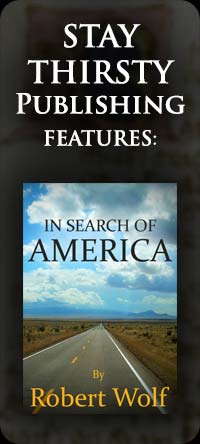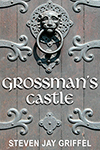

A Conversation with Legendary NYC Super-Cop Ralph Friedman
By Steven Jay Griffel
Queens, NY, USA

It appears I was wrong about Ralph Friedman. Based on his legendary exploits, news clippings, and recent media notoriety, I'd assumed he was a kind of dark superhero … one with a serious flaw—most likely a psychological one—which, when understood, would help explain his motivations and possibly his vulnerability. I thought if I understood his motivations—the forces or demons that compelled him—I might understand how he could have acted so selflessly, so courageously, to become the most decorated detective in the history of the New York Police Department. But a man cannot be equated with his press. In Friedman's case, I learned that the truth is way less dark but no less fascinating: As a NYC cop, Friedman discovered the one thing in life that truly enlivened him—he embraced it, fiercely, and has been running with it ever since.
Though we both hailed from the same neighborhood, I was not like Friedman, strong and brave. I was afraid of my own pale shadow. You see, God hadn't done much to help me help myself. I was a poorly designed self-champion: too scrawny to fight, too slow for flight. One summer I half-heartedly took Charles Atlas's back-page advice to transform myself from 97-pound weakling to He-Man. I bulked up to 120 pounds. I could lift five library books above my head. Still, it didn't seem enough. I knew I couldn't protect myself and my loved ones from the Forces of Evil.
I was still young and living in the Bronx when I first heard of super-cop, Ralph Friedman. Even if he couldn't actually bend steel in his bare hands, knowing that he was a member of my tribe, strong and brave as Judas Maccabee, made me proud.
In May I visited Ralph Friedman in his Connecticut home and asked him how he'd become a legend.
STEVEN JAY GRIFFEL: It sounds like you were a pretty good student, a pretty good athlete, but nothing special. Just another teenager growing up in the Bronx … except for the fact that you had been lifting weights since you were twelve and were very strong. Why did you decide to skip college and go to work?
RALPH FRIEDMAN: I never thought of going to college. My mindset was to go out and work, to feel independent and be on my own …to make my own way. I felt strong and ready to take on the world.
STEVEN JAY GRIFFEL: After high school you worked as a furniture mover. Tell me about it.
RALPH FRIEDMAN: As soon as I got out of high school my father helped me get a job through people he knew. I became a furniture mover with Neptune World-Wide Movers. It was perfect for me. It was like an 8 to 10-hour workout, lifting all day and getting paid great. I was making $4.50 an hour and the rest of the country was making $1.15 an hour and I got overtime after 8 hours, where everyone else had to work a 40-hour week to start to make overtime. After working all day I'd go home and work out with weights for two more hours. Life was good.
STEVEN JAY GRIFFEL: Two friends were planning to take the police academy exam and casually asked if you wanted to join them. Why did you agree? How did your parents feel about it?
RALPH FRIEDMAN: I was out on a Friday night with two friends and as we were going home I asked what they were doing tomorrow and they said they were taking the police exam (it was a walk-in test in the 60's). I said, "Knock on my door, if I get up, I'll go with you." I took the test the next day and after the test I was thinking that being a cop would be a good job: I could move up without college, plus I'd be working in the street, not confined to an office, which I could never do, and it seemed like it would be an adventure. My parents really wanted me to go to college. Before I got the moving job, my father tried to bribe me to go to college by getting me my dream car ('67 Pontiac GTO), which he couldn't really afford but he had to take a loan or whatever to get it. My parents also felt police work wasn't really for Jews. We had no friends or family that were police officers. I would be the first, but my brother would follow four years later.
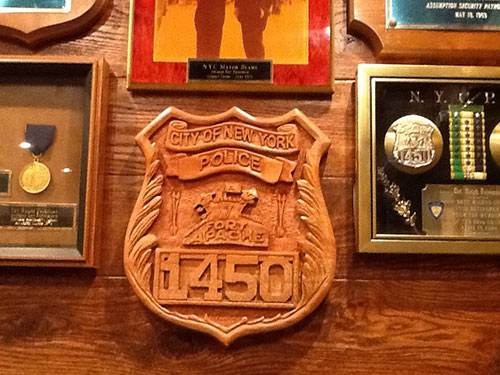
STEVEN JAY GRIFFEL: After two years of training, you were assigned to the Bronx's 41st Precinct, aka "Fort Apache," a veritable war-zone of drugs, arson, and violent crime. Did you feel prepared for such a first assignment?
RALPH FRIEDMAN: In 1968 I became a police trainee because I was only 19 and you had to be 21 back then to become an officer. So I worked indoors for two years, doing things officers did in the precincts. Right before turning 21, I went into the police academy, which was four months long at the time. On February 2, 1970, I was appointed patrolman and assigned to the 41st Precinct, known as "Fort Apache." That place had a very violent reputation, but I felt proud to go there and make my way. Working there for one year would be like working ten years in another precinct. I was ready and eager and nervous all at once but couldn't wait. I was prepared mentally and physically and was in my best and strongest shape. I felt combat ready.
STEVEN JAY GRIFFEL: Give me a sense of your typical day on the streets of Fort Apache.
RALPH FRIEDMAN: There were no training officers. You were just sent out on the street. You were given a post and you had to figure out on your own where it was. I was in a brand new uniform so everyone knew I was a rookie. I felt like I really stood out. On the street you're alone except for your training and equipment and common sense. You know the bad guys are all around and violence is just minutes or seconds away.
STEVEN JAY GRIFFEL: You got a taste of adrenaline while in the academy but experienced its real rush while serving in Fort Apache.
RALPH FRIEDMAN: This job and experience immediately started me on an adrenaline rush, which just kept escalating and I couldn't do enough police work to quench it. This adrenal rush turned me into an arrest machine ... always seeking action and bad guys ... on and off duty ... it wouldn't stop.
STEVEN JAY GRIFFEL: You went from rookie cop to detective in just four or five years, right? Was it your cumulative record of arrests, or was there a particular case or two that earned you the promotion?
RALPH FRIEDMAN: I made plainclothes (anti-crime) in about fourteen months, and by the time I had five years on the job I made detective. In those days it was extremely rare to make detective at that age … the other detectives were fifteen years older than me.
In the 41, Fort Apache cops were always making quality arrests that would be newsworthy in other parts of the city but didn't make the papers because of the routine violence in the ghetto.... I stood out because I was always involved in the action … this brought me to the attention of higher ups in the department. As an example, one day, me and a partner responded to a burglary run with a woman screaming. We got there before uniformed officers and saw the apartment on the top floor was in fact broken into and we did hear screams coming from within. We rushed in. It was 2 pm but the apartment was dark ... the windows covered ... it was pitch black. We heard more screams from the rear of the apartment and we immediately headed there with guns drawn. As we were about to enter the rear room, a man appeared about three feet in front of us and without hesitation just started firing at us. We were met with a hail of bullets. Me and my partner both returned fire and in this small hallway we exchanged 18 shots at three feet. My partner went down immediately while he was returning fire. He was hit 7 times, 5 direct hits and 2 ricochets ... one of those wounds was to the heart. I was returning fire also and the perp tried to run past me while he was firing. I shot him numerous times and the last shot was right into his heart at point-blank range. My partner lived but required major surgery and 72 pints of blood in three hours, which made medical history. I was not hit at all, which was amazing given the closeness of this 18-round exchange, and I did in fact kill the perp. The mayor at the time, who was John Lindsay, was flown by helicopter to speak to me before I held a press conference. His helicopter landed on Pelham Parkway, right in front of Jacobi Hospital. This incident made front-page news.
Another big newspaper story was when me and my partner Robert De Matas were following a group of teens that we suspected were going to rob someone because they kept approaching people and asking for money. We kept them under observation from a yellow taxi we were using for anti-crime patrol. Then all of a sudden they approached and exchanged words with someone who pulls out a gun and shoots one of the teens in the chest. I'm driving and gun the cab right up to the shooter and jump out screaming, "Police! Freeze!" Again I was met with a hail of bullets, and we had a running gun battle up the street until he took up position by a car and reloaded. My partner immediately ran across the street to out-flank the shooter but could not fire because he had no clear shot … and the perp was alternately firing at him and me. I had clear shots and was taking them. I emptied my gun, went to my second gun, and continued firing. Finally, my partner fired one round, striking the shooter in the shoulder, and he went down. I ran up to the shot perp. He was lying on the street. He still had a gun in his hand and he started to lift his gun hand. I was standing over him and shot him in the head, immediately killing him. When he was lifted up by the ambulance attendants, his brain fell out onto sidewalk... Later, at the morgue, it was discovered that I'd already shot the guy several times in the stomach, but he was so high he kept coming.
STEVEN JAY GRIFFEL: As a detective, you didn't dress like the guys on TV's Law and Order. Those guys wear suits. Based on the photos I've seen, you were a leather jacket and jeans kind of guy.
RALPH FRIEDMAN: My bosses really didn't bust my chops about dressing like other detectives because they knew I was a very active detective who was always on the streets, making arrests off my investigations and also making pick-up arrests. I was always bringing in results, which made them look good to their bosses and made the police department look good too. My squad bosses assigned me all the robbery and gun cases and sometimes I worked with anti-crime officers to go after stick-up teams and street guys known to carry guns…. Everyone was happy, and I was feeding my addiction to the adrenal rush. Life was good.
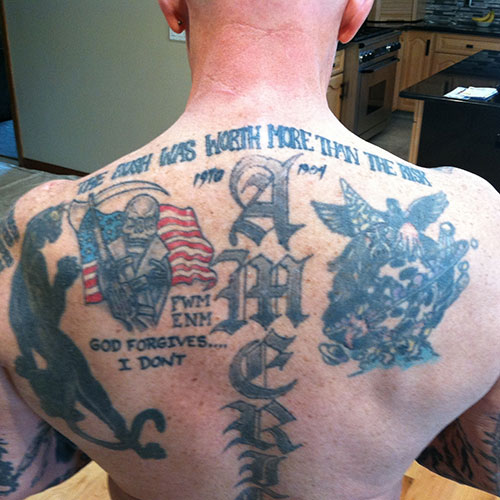
STEVEN JAY GRIFFEL: THE RUSH WAS WORTH MORE THAN THE RISK is tattooed in an arc across the top of your back. Tell me more about your craving for excitement.
RALPH FRIEDMAN: It pretty much took over my whole life. Even off duty, I was never really off duty. The rush had to be fed. I was always aware of my surroundings and always spotting someone with a gun ... be it on duty or off duty. I made arrests in the gyms when working out.... I went to Yankee Stadium with my brother with two girls and we made a robbery arrest while leaving the stadium.... One night I was riding my Harley from Manhattan to Queens with a girl and we pulled over on East River Drive and we were making out on one of benches facing the water … and while were making out I notice three guys nearby and they're watching and approaching. I knew they were up to no good. I told the girl, "If you see me go for my gun, just drop to the ground." The three guys got real close and looked me over but didn't get too close and didn't say anything. Then they walked away and approached three other people by the 78th Street overpass, going west towards York Ave. Then they moved on and approached two more people at the top of the overpass. I walked over pretty fast and asked the first three people that had been approached what the suspicious-looking guys had said to them. They said those guys had guns and had just robbed them. I immediately ran up the ramp and spoke to the two people there, and they told me they had also been robbed at gunpoint, so I chased the three perps and yelled "Police!" and again was met with a hail of bullets and I returned fire and we had a running gun battle up the street and they had a car waiting for them and they got in and took off. I jumped into a yellow cab and the driver panicked when he saw me and thought I was robbing him. He stopped the cab and was throwing his money into the backseat and screaming, "Don't shoot!" By the time I could tell him I'm a cop the perps got away.... By the end of my fourteen-year career I made over 100 off-duty arrests.... No matter what I was doing or where I was going, if a crime was occurring I would effect the arrest. I never hesitated. I never thought of not taking action.
STEVEN JAY GRIFFEL: You joined the police force in 1970 and retired in 1984. This was a dark period in New York City and roughly coincides with the nadir of Central Park and the release of Charles Bronson's Death Wish films. Largely because of such bad press, NYC's caretakers began serious efforts to improve New York's quality of life. Were you aware of new mandates in the police department to clean up the city? How did these changes affect the way you dealt with suspected criminals?
RALPH FRIEDMAN: At the time I came on the job, the Knapp Commission was going on. This was a corruption commission to weed out cops that were taking money. I guess a lot of people would remember it as the Serpico days. The times and the department were making big changes. The department wanted clean cops and clean streets. They supported you going out and being pro-active ... they wanted guns and criminals off the street ... and all this was fine with me because chasing and arresting criminals was feeding my adrenaline rush.
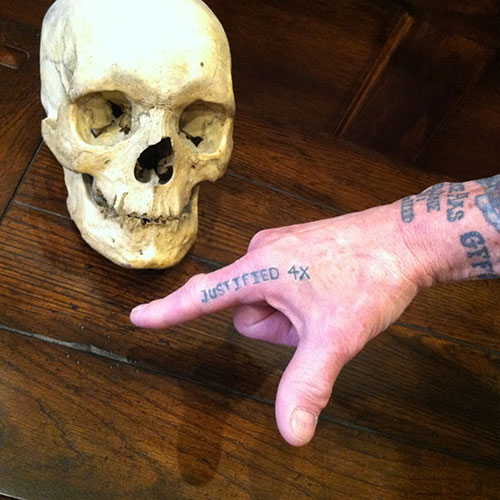
STEVEN JAY GRIFFEL: You arrested more than 2,000 suspects, a NYPD record that still stands. According to Bronx legend, an inordinate number of these suspects required medical assistance before they could be formally charged. Any truth to this?
RALPH FRIEDMAN: In fourteen years I effected over 2,000 arrests and assisted in more than 5,000 others. I made over 100 off-duty arrests. I was involved in fifteen shootings … shot eight perpetrators, killing four of them. Many of the perpetrators required medical attention after I arrested them but that was because I was dealing with very violent felons who did not want to go to jail. Many made the choice to fight me. It's not my fault they made the wrong choice.
STEVEN JAY GRIFFEL: I see that "Justified 4X" is tattooed on your right trigger finger. I suppose its placement is significant. What's the story?
RALPH FRIEDMAN: On four different occasions I used deadly force to end a threat. In each case, I went before the Grand Jury, and they voted I'd been justified. Whenever you take a life you have to go before the Grand Jury and explain the circumstances. If you weren't justified, then you could be indicted and arrested and go to jail. It never bothered me that I had to kill four criminals. To be perfectly honest, I felt good after killing them because I was alive. They were trying to kill me or my partner, and if I didn't stop them, they would have killed us. In all four cases where I permanently ended a threat I was found justified, hence the tattoo Justified 4X on my trigger finger. On one of those occasions we were having an informer purchase a gun from a seller and his accomplice, and we were watching from several connected roofs away. All of a sudden, the seller starts firing the weapon to show it works. My partner and I start jumping over roofs to get to the gunman. As we approached, he turned the gun on us. We both shot him, but the second perp ran a few feet away and got behind a kiosk. Out of ammo, I drew my second gun and slowly approached one side of the kiosk. When I got close, the second perp jumped out with a knife raised to stab me in the head. I started to pull the trigger but heard a shot—my partner had shot him from behind to prevent him from stabbing me. The second perp immediately went down and my partner returned to the first, who was lying on the ground. As I approached the second perp to take away his knife, he got to his feet, knife in hand, and came at me again. I shot him in the stomach, killing him instantly.
STEVEN JAY GRIFFEL: You have been repeatedly stabbed, shot at, and had your skull smashed. How do you explain your unlikely survival?
RALPH FRIEDMAN: Unbelievably, I have never been shot....I have been shot at numerous times by perps and once by police. An officer fired six rounds at me during a riot situation. Prior to this, there was a message we didn't hear that stated no plainclothes cops were to enter that area. Ironically, it was good we didn't hear that message because we recovered dozens and dozens of Molotov cocktails that were going to be used against police officers. By the way, to this day that officer doesn't know he fired on another officer. These are the risks of plainclothes work…. By the way, I have never been stabbed, but I have been cut a few times. And I broke my hand three times, and my head was fractured twice. I gave up trying to count how many broken bones.... I guess it was Fate that I'm still around.
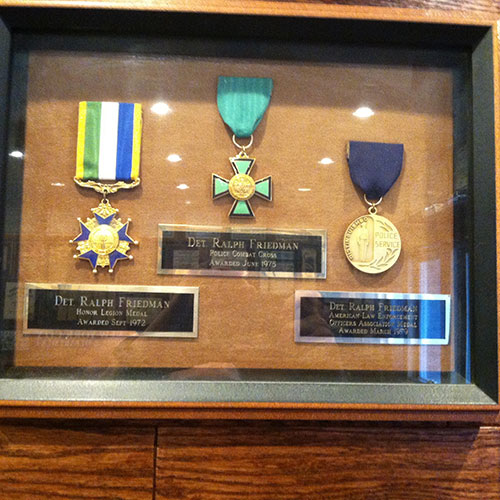
STEVEN JAY GRIFFEL: Your extraordinary career has been commemorated with 219 NYPD awards. Which are you most proud of?
RALPH FRIEDMAN: I am proud of all my awards, but my most prized is the New York Police Department's Combat Cross, which I was awarded by Mayor Beam and Police Commissioner Donald Cawley. I received the award for the running gun battle with the perp who shot the 15-year-old in the chest. It's the department's second-highest award, the highest being the Medal of Honor. Ninety-eight percent of Medal of Honor recipients are awarded that medal posthumously.
STEVEN JAY GRIFFEL: You are not as large a man now—in your mid-sixties—as you were when you were a detective on the NYPD, but with your shaved head and arm-sleeve tattoos I wonder if you have consciously donned a new kind of uniform. What kind of impression do you want to make now—and why?
RALPH FRIEDMAN: I started getting tattoos when I was twenty and they are habit forming. They actually helped me with my police career. Looking as I do, I was often approached by perps to buy weapons or drugs. I don't feel I was ever making a statement. I'm just being me. I like tats.
STEVEN JAY GRIFFEL: In your new home in Connecticut, you are building a den and exhibit hall of your storied career. In addition to your NYPD honors, I see that you also received 36 civilian awards. I know you take the motto "To protect and serve" very seriously. Which of the civilian honors do you prize the most?
RALPH FRIEDMAN: I really prize them all, but the one that stands out is the Distinguished Service Award that the NYPD submitted for in Washington DC. It is considered a civilian award because candidates are chosen from all over the country and the award honors their overall career accomplishments. All my other community awards were for outstanding service to New York City communities.
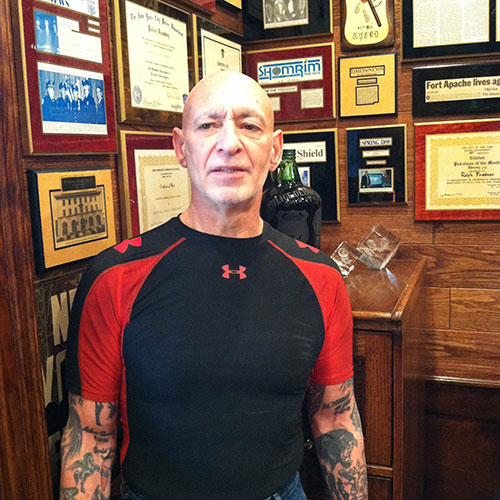
STEVEN JAY GRIFFEL: Tell me about the accident that ended your career.
RALPH FRIEDMAN: My career ended suddenly. My partner and I were responding to an officer's call for help. My partner was driving our unmarked car and we got T-boned on my side, breaking 23 of my bones and shattering my hip. Ironically, the car that T-boned us was a marked police car responding to the same call.... Doctors didn't think I'd be able to walk again, but I proved them wrong. It was a lot of hard work that took all my time and effort.
STEVEN JAY GRIFFEL: You had plenty of visitors while you were in the hospital—including an impressive number of girlfriends.
RALPH FRIEDMAN: I was in the hospital a long time. Before the accident I was dating seven or eight girls and they were always running into each other while visiting me. One day I woke up and they were all there at the same time. I made like I passed out again from the drugs. One girl hung in there as the others started phasing out. She came every day and said she knew that I'd recover. She's still with me, 32 years later.
STEVEN JAY GRIFFEL: You were relatively young when your injuries forced you to retire. What are you doing now to occupy your time?
RALPH FRIEDMAN: After retiring I spent a very long time recovering from my injuries and getting back to a decent quality of life. I stay in touch with old partners and I've made new police friends in Connecticut. I always enjoy talking to officers and networking and staying in the loop. I'm also working on a book and doing some interviews. I have been on Fox and Friends regarding my police career and my current opinions. I have an agent and we're hoping to do something on TV or possibly a movie. We'll see where all this goes.
STEVEN JAY GRIFFEL: Knowing what you know now about yourself and the world, would the young Ralph Friedman join today's police force?
RALPH FRIEDMAN: Today's police department is under a lot of political pressure from within the department and from outside. One big job-changer today is the cell phone cameras and videos. Your every move and decision is being recorded. It's a very hard way to work. And I personally believe it hinders officers and makes them hesitate and think: What if I do this? ... instead of taking an immediate police action, the way they were trained. They're getting into positions where they are going to get hurt bad and possibly killed ... or civilians can get hurt. Cell phones and cameras are destroying police effectiveness. I would not have accomplished all I did by working under these conditions.
Links:
Steven Jay Griffel at Stay Thirsty Publishing
Steven Jay Griffel on Facebook

